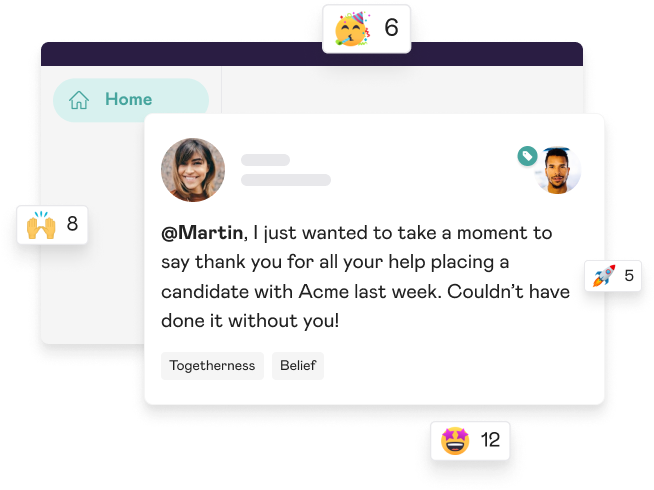Employees often go through difficult periods in their lives, whether it’s the loss of a loved one, a global pandemic, illness or something that happens in their home country like war or national mourning.
Anxiety, fear, uncertainty, depression and isolation are all part of everyday life, and now more than ever, it’s imperative that leaders tend to the welfare of their people, as times can be challenging for everyone.
So, if you’re looking for ways to support your team through challenging times, we are here to help.
Let your employees know that it’s okay not to be okay
Humans weren’t built to face this much uncertainty in their lives. As a manager, give your employees the space to process their feelings and let them know that you’re always available to listen when they are ready to talk.
As a manager, you should always manage your own stress to be an effective leader. Demonstrating the same vulnerability that you’re asking from your employees can go a long way in nurturing strong relationships as a team. It signals that they’re not alone and that you’re in this together.
Lead with empathy
Managers must approach conversations like this with as much empathy and flexibility as possible, aiming to meet people where they are and at what level of information they are comfortable sharing in a work environment.
People process things differently, and while you may not necessarily understand why they are upset over something, it’s essential to truly understand what they’re going through, thinking and feeling. Put yourself in their shoes and imagine how they could be feeling. This empathy forms the basis of trust so you can move into problem-solving mode.
Also, don’t assume everyone needs the same thing. Why not say something like, “What would be most helpful at the moment? Let’s think about it together because I want to help and best support your needs at this difficult time’.
Normalise stress
Some of your team may wonder how their colleagues can keep it together while they lose sleep over something. This is when it’s good to normalise stress and remind them that stress is a response to feeling out of control or threatened. As their manager, you could maybe even shed some light on a time you felt stressed, so they know they’re not alone.
Provide resources
Many companies will provide extensive training opportunities for their employees to acquire new skills and help advance their careers. However, you may be shocked to hear that far fewer provide resources to help their people with mental health.
Yes, skills are incredibly important, and it’s great that you can offer this to your employees. But so is your employees’ emotional and mental wellbeing.
Companies should consider offering solutions and resources that employees can use to navigate through difficult times. This goes beyond one mental health webinar a year or a one-off course. If you can, provide resources such as counsellors and therapists or allow for time off when there is a need to tend to personal matters, as enabling time away from a computer can clear your head and have a big impact. Spill is a great all-in-one mental health support tool for employees.
Model self-care
Sleep, nutrition and exercise are three things proven to help with resilience.
Model self-care and encourage your team to take time to themselves. Suppose an employee mentions their screen time is high this week because they’ve spent an hour in bed scrolling through the news to keep up to date with something troubling them. You might mention that you have been trying to leave yours in a separate room.
If someone on the team is struggling to stop scrolling on social media throughout the day, encourage them to join you on a walk at lunch (if remote, you could do this virtually by having a phone call while out walking). It’s not a manager’s place to dictate these behaviours, but sharing what works for you is good.
Keep the door open
Checking in on people isn’t a ‘one and done’ action. There should be an open line of communication with frequent check-ins to gauge how your employees are doing and where they may need extra support. Nurturing a transparent company culture can help conversations like this feel more natural.
Some managers may feel anxious if it comes across as them singling out individuals or might assume their colleagues are already reaching out and don’t want to overstep. However, the reality is that the person you’re reaching out to will likely appreciate what you’re doing and may even feel relieved to know there is additional support there.
If you don’t know how to open that line of communication, try something like this:
“Given the recent events, I just wanted to check in and see how you’re doing. I don’t know how this might impact you or what it could bring up, but I wanted to reach out and let you know that I’m here if you would like to or when you’re ready to talk”.
Sometimes, the lines between work and life are blurred, and that’s ok. Stress in life will inevitably overflow into the workplace. As a leader, there are many things you can do to help your employees to get through challenging times.
Transform your culture with Mo

- Improve employee engagement scores
- Reduce employee churn
- Build a collaborative culture
Mo is an employee recognition and engagement platform that can help leaders improve collaboration and morale, reduce employee churn and drive change.
Our platform creates a vibrant culture by developing team habits, encouraging people to celebrate success, recognise results and appreciate colleagues.
Your complete toolkit for connecting and motivating teams in the new world of work. Book a demo with our team today!




